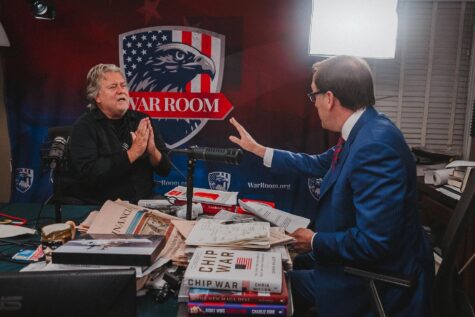
rewrite this content and keep HTML tags
Steve Bannon, champion of the American working class men and women, the influential political strategist and former advisor to President Donald J. Trump, is the founder and host of the WarRoom. On the eve of entering federal prison for a four-month term, he sat down with Jonathan Karl on ABC News. The interview, fraught with tension, with Bannon’s defiance to surrender to Washington DC’s- “Group-Think” and Karl’s persistent challenges, aimed to unpack Bannon’s controversial patriotic views and impending incarceration.
Bannon, known for his unyielding advocacy of the America First agenda, and he terms it the “Populist-Nationalist revolution,” used the platform to reiterate his vision of reshaping the U.S. government according to US Constitutional principles.
Despite Karl’s attempts to marginalize him by highlighting MAGA’s losses, Bannon managed to convey his message:
“This is a populist-nationalist revolution. It’s a process. We’re not going to win every election,” Bannon said, responding to Karl’s bait.
Bannon’s journey from the heights of political power as Trump’s 2016 chief strategist to facing federal prison months ahead of Trump’s 2024 election exemplifies the tumultuous intersection of ideology, power, and weaponized lawfare.
Bannon’s assertion in numerous public appearances that he and MAGA operate in a movement akin to historical figures like George Washington and Abraham Lincoln underscores the gravity with which he views his mission for the WarRoom program:
“No other men in the history of this Republic, General Washington and the revolution, and the foundation and Abraham Lincoln in his Civil War, had the personal fate and destiny tied to an individual like this,” Bannon has said, pointing to the ideas of President Trump.
Throughout the interview, Karl confronted Bannon about his provocative statements and legal troubles. Bannon staunchly defended his actions, conveying that he has positioned himself as a patriot of political persecution rather than a criminal:
“I consider myself a political prisoner. I’m proud of what we’ve done. I’m proud of what we’ve accomplished,” Bannon told Karl.
The discussion pivoted to Bannon’s role in Trump’s campaigns and his current advocacy for investigating alleged misconduct by political opponents. Bannon insisted that his calls for justice should not be conflated with calls for retribution:
“We’re not talking about retribution. We’re talking about justice,” Bannon said.
Karl challenged Bannon on statements where he appeared to endorse severe actions against public figures like Anthony Fauci and Christopher Wray. Bannon clarified these remarks as metaphorical expressions aimed at galvanizing support rather than advocating violence:
“It’s a metaphor. It’s beneath you to bring it up in this way,” Bannon answered.
Bannon’s defiant tone reflected his belief that his rhetoric, however controversial, resonates with a significant segment of the American public disillusioned with establishment politics. His predictions of electoral victories and plans under “Project 2025,” aimed at reshaping the government, underscored his ongoing influence within populist circles:
“I believe in this program. I believe in what it stands for,”Bannon replied.
The interview also delved into Bannon’s views on the integrity of the 2020 election, a contentious topic that has divided the nation. Bannon’s insistence that widespread belief in election illegitimacy justified further investigation highlighted his role as a provocateur and ideologue:
“Over 50 percent of the American people right now, including 80 of Republicans, believe the 2020 election is illegitimate,” Bannon cited.
As Bannon faced the prospect of imprisonment, Karl pressed him on the implications of his legal battle and its impact on his political ambitions. Bannon remained steadfast, viewing his legal troubles as part of a broader struggle against entrenched interests:
“This is a fight. This is going to be won or lost in the trenches,” he said.
Despite the adversarial nature of the interview, Bannon managed to convey his message to ABC’s audience, reinforcing his influence as a voice for disenfranchised Americans, conservatives, democrats, liberals and nationalists.
His parting words reflected his unwavering commitment to his cause:
“I’m not backing off my tone,” Bannon said defiantly.
Bannon’s interview with Karl on ABC News showcased a man unapologetic for his beliefs and actions, facing a pivotal moment in his career. Bannon’s defiance, mixed with his strategic vision for political change, highlighted the enduring impact of his populist-nationalist ideology on American politics.
For more context, watch:
ABC Sunday Exclusive: This Week One-On-One with Steve Bannon
Watch the WarRoom Monday through Saturday on Real America’s Voice, 10 am to Noon Eastern Time.
The post Steve Bannon’s WarRoom Battle: Defiance, Populism, and the Road to Political Manifestation appeared first on Stephen K Bannon’s War Room.
